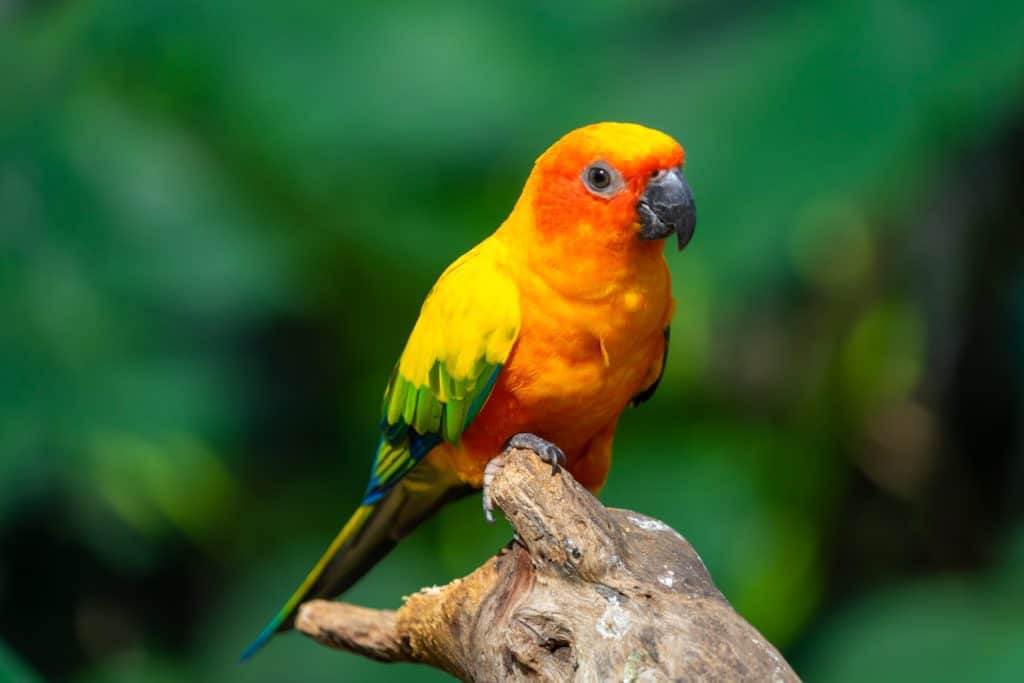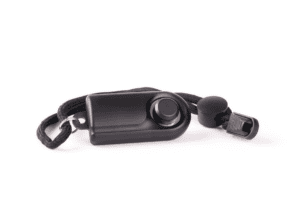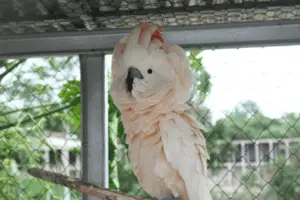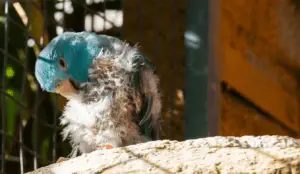What size cage is needed for a conure parrot? Conures can be highly active and playful, so they need a dedicated space for flying and exploring. There should also be room for toys as they help keep conures occupied.
A conure’s enclosure should be at least 18 to 24 square inches, depending on its size. This cage size will allow the parrot to extend its wings fully. It will also provide a good amount of space for perching.
What Size Cage Is Needed For A Conure Parrot?
Are you planning to take a pet conure home? If yes, one of the first things you must prepare when adopting a conure is its enclosure. Your parrot will spend most of its time inside this cage, so it needs to have enough space for flying, playing, and other activities to keep it happy.
A small cage can prevent your conure from moving as much as it needs, which leads to boredom. Such living space can even cause depression for this parrot in the long run. So, what size cage is for a conure parrot to keep your pet happy?
What Is The Best Cage For A Conure?
A small conure, like the fire tale, should have a cage that measures 18 square inches at a minimum. On the other hand, larger conure species will thrive in an enclosure that measures at least 24 square inches. The larger the pen you can get for this parrot, the better.
These birds are active, so you must ensure that their living conditions support their personalities. They also love to snuggle under toys, so you need to place items like bird tents and bird hides inside the cage. Take note that everything you will place within the enclosure takes up space. So, your conure’s pen must still give it enough room for flying even after putting all the bird’s necessities inside. (source)
Factors To Consider When Choosing A Conure Enclosure
While a conure’s cage size is essential, it is not the only thing that matters when buying a cage for your avian friend. Instead, there are factors that you need to focus on to guarantee excellent living conditions for your conure.
Cage Shape
The ideal cage shape for a conure is one with angles. It can be square or rectangular with horizontal bars, but never get a round cage for your pet parrot. Conures love climbing up the bars of their enclosures. If your pet lives in a round-shaped cage, climbing on the curved bars may be too difficult.
In addition, an angled cage will hold perches steadily, preventing it from shaking as your parrot stands on it.
Cage Material
Your conure’s enclosure should be sturdy and solid. This bird likes to bite things, so it will try chewing on its cage. For this reason, its enclosure should consist of non-toxic stainless steel that does not chip. It will prevent your conure from swallowing anything that can be detrimental to its health.
Remember that you are getting your conure a cage to protect it. So, your cage should not pose any hazard once your pet is already living in it.
Bar Size And Spacing
As mentioned, conures like biting things, so it will inevitably chew on its enclosure. For this reason, the space between the bars of your conure’s enclosure should accommodate its beak. You must ensure that your avian friend will not struggle once it chews on the bars. The space between the bars must not be too narrow so that its beaks would be stuck and not too wide so it can stick its head out.
Your conure can also be a tiny escape artist. You’ll be surprised at how much it can squeeze its body to get out of its cage. So, the spaces between the cage bars must be small enough to prevent them from escaping. (source)
My Favorite Cages For Conures

Conure cages can come in all shapes and sizes. However, there are a few things you should consider before purchasing.
Size, ease of maintenance, ease of daily use, and lockability, these are all items you need to consider seriously. I’ll talk a bit about each relating to each of the cages I really like for conures or other similar parrots.
Here’s a quick run-down of how I rate cages so we are on the same page.
- Size – If it’s a good fit for your bird’s requirements.
- Affordability – Whether the cage is appropriately priced for the options you get.
- Ease of Maintenance – Cleaning is important and must be easy as possible.
- Ease of Daily Use – Daily functions are critical to work properly for you and your bird.
- Lockability – Have you ever had a parrot escape and fly away? Better ensure the cage locks well.
My Two Favorite Budget and Apartment Sized Cages
Yaheetech 55-inch
Overall Thoughts: This 55” tall overall cage and stand combo are a great purchase to house a single conure. The cage is a bit small for more than one, but if you only have a single pet and a tight space, this could be the cage for you.
PENN-PLAX
The cage is made of iron and black in color. The bars are spaced at 0.6,” and the multiple roofs give the cage a house-like overall appearance.
Overall Thoughts: This is a decent little cage for a single conure. They say it’s a kit because it comes with a couple of dishes, perches, a play swing, some other various items, including cuttlebone, and apparently food (although I’d toss this for better quality eats).
The cage doors don’t lock well. They are gravity-fed sliding and can be a bit of a pain to deal with. A smart bird will quickly learn to slide them open, so you need to pick up some metal clips to hold them shut.
Overall, this is a pretty decent little starter cage for a single bird, however, it does not come with a base, which I found unfortunate.
My Favorite Medium/Large Sized Cage For Happy Conures
Nvifco Large Bird Cage
Overall Thoughts: This is a great cage to happily hold a pair of Conures. The cage has a very large central door, making it easily accessible (although easy for them to escape when it’s open too). The door lock is excellent and extremely difficult for them to open, while easy for you.
The stand is wheeled and has a shelf for storage. The cage has an insert tray that slides out for easy cleaning without needing to open the cage. Overall, I recommend this cage for your conure(s).
My Favorite Conure Palace For Their Best Life
Yintatech
Overall Thoughts: What I really like about this cage is that it’s taller in the cage than most in this size class. There’s still the built-in shelf, but it’s not as high as the Nvifco, allowing the cage to take up the extra space without making the overall height unmanageable.
The cage has high-quality castors, and the bottom tray is easily removable to make cleaning really easy, even when your birds are in the cage.
This cage provides a pair of conures with a nice big and comfortable space to call their home. Although not big enough for them to fly like a walk-in aviary is, in terms of cages, this could be the next best thing.
Setting Up A Conure’s Cage
Now that you have the enclosure for your pet conure, the next thing you need to do is to set it up. However, simply putting it in a room and filling it with toys, a food bowl, and a water container is not enough. Conures are highly inquisitive, so you must create a proper setup and find an ideal location to accommodate their personality.
Find a good spot for your conure’s enclosure.
Boredom is the enemy of your pet conure. Apart from playing with its toys, this bird can entertain itself by watching its surrounding. For this reason, you should never place its cage somewhere that it will not see its caretaker.
The position of your conure’s cage should give it a view of what is happening around it. If you cannot place the cage in an area where your conure can constantly see you, an area near a window is ideal. This way, your pet bird will have a good view of a landscape, which will keep it entertained. However, you must also ensure that your pet cannot pass through the window if it escapes from its cage.
Place a few perch spots.
Conures love sitting on perches. So, please provide them with a few perch spots at different heights. The perch materials should also vary to give your pet various forms of stimulation. For instance, flexible braided rope perches stimulate balance, while wooden perches give them something to chew on and enjoy.
Regardless of the perch materials, they should provide a ¾-inch gap between your conure’s front and rear nails.
Water bowls and food bowl
A conure enclosure should have one food bowl and two water bowls – one is for drinking, and the other is for bathing.
Provide space for toys
- Conures are intelligent birds. Apart from snuggling under toys, they also love ladders
- twisty toys
- puzzles
- ropes
However, the toys you will place inside the bird’s cage should not be too small as they can cause a choking hazard if your pet accidentally swallows them. You must also prevent your conure’s rope and twisty toys from entangling with its body. (source)
Final Thoughts
When it comes to a conure’s enclosure, the rule of thumb is that the bigger, the better. It will provide your conure with enough space for its essential items like perch spots, water and food bowl, and toys.
Do you have any questions about conures? If you do, feel free to leave them in the comments section so we can have a conversation!
A conure should have a big cage so it can fly without its wings touching the cage bars. Providing your pet with enough space will also accommodate its energetic and curious personality.
- Anne Watkins. The Conure Handbook. Sourcebooks, Inc., 2015. Accessed September 13, 2022.
- Gina Spadafori and Brian L. Speer. Birds For Dummies. Canada: John Wiley & Sons, 2011. Accessed September 13, 2022.
- Ray Dorge and Gail Sibley. A Guide to Popular Conures as Pet and Aviary Birds. ABK Publications, 2001. Accessed September 13, 2022.
Lorem ipsum dolor sit amet, consectetur adipiscing elit. Ut elit tellus, luctus nec ullamcorper mattis, pulvinar dapibus leo.














